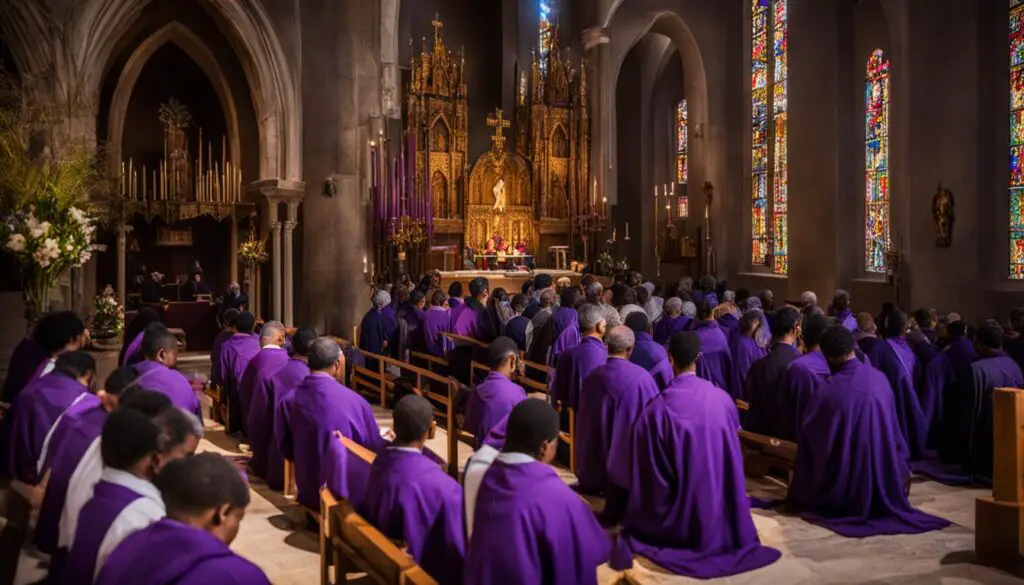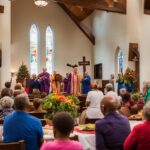Holy Week is a sacred time for Christians worldwide. It is a week filled with deep reflection, profound devotion, and joyous celebration. During Holy Week, believers commemorate the final days of Jesus Christ’s life on earth, from his triumphant entry into Jerusalem to his crucifixion and resurrection. It is a time to honor and reflect on the significance of his sacrifice and the hope and joy that his resurrection brings.
Throughout Holy Week, churches organize various activities, prayers, rituals, and traditions to guide individuals on their spiritual journey. These church activities during Holy Week provide opportunities for believers to deepen their faith, strengthen their relationship with God, and foster a sense of community with fellow believers. From Palm Sunday to Easter Sunday, each day holds its own significance and offers unique opportunities for worship and contemplation.
Key Takeaways:
- Holy Week commemorates the final days of Jesus Christ’s life on earth.
- Church activities during Holy Week guide individuals on a spiritual journey.
- Holy Week consists of significant days such as Palm Sunday, Holy Thursday, Good Friday, and Easter Sunday.
- Each day of Holy Week offers unique opportunities for worship, reflection, and celebration.
- Holy Week is a time to deepen faith, reflect on Jesus’ sacrifice, and celebrate the hope of his resurrection.
The Significance of Holy Week
Holy Week is a sacred time for Christians around the world. It holds immense significance in the Christian calendar as it represents the culmination of Jesus Christ’s earthly ministry, from his triumphant entry into Jerusalem to his crucifixion and resurrection. Holy Week is a time for believers to reflect on the sacrifice and love of Jesus, deepen their faith, and prepare for the joyous celebration of Easter Sunday.
Church activities during Holy Week play an integral role in guiding individuals on their spiritual journey and fostering a sense of community and devotion. These activities include special services, prayers, rituals, and traditions that help participants connect with the story of Jesus’ final week on earth. From Palm Sunday commemorations to Good Friday observances, each church activity during Holy Week serves as a reminder of Jesus’ ultimate sacrifice and reminds believers of the importance of their faith.
Furthermore, Holy Week church traditions during Easter provide an opportunity for believers to engage in practices that deepen their understanding of Jesus’ journey. These traditions may include the making of palm crosses, participating in Holy Thursday communion and foot washing services, attending Good Friday liturgies, and engaging in quiet reflection and prayer on Holy Saturday. These customs and traditions add depth and meaning to the Holy Week experience, allowing believers to connect with the significance of Jesus’ life, death, and resurrection.

Table: Church Activities during Holy Week
| Activity | Significance |
|---|---|
| Palm Sunday | Commemorates Jesus’ triumphant entry into Jerusalem |
| Good Friday | Remembers Jesus’ crucifixion and sacrifice |
| Holy Thursday | Commemorates the Last Supper and Jesus’ act of service |
| Holy Saturday | Reflects on the mystery of Christ’s death and resurrection |
| Easter Sunday | Celebrates Jesus’ resurrection and the triumph of life |
During Holy Week, participating in these activities and traditions becomes an opportunity for believers to grow in their faith, connect with their community, and experience the transformative power of Jesus’ love and sacrifice.
Palm Sunday Activities
Palm Sunday, also known as the first day of Holy Week, holds great importance in the Christian calendar. It commemorates Jesus’ triumphal entry into Jerusalem, where he was welcomed with palm branches and hailed as the Messiah. Palm Sunday activities in churches create a meaningful experience for believers as they participate in services that reenact the biblical events and express their faith through worship.
One popular Palm Sunday activity is the distribution of palm branches to the congregation. This symbolic gesture represents the palm branches laid down by the crowd as Jesus rode into Jerusalem. It serves as a reminder of the adoration and praise given to Jesus as he fulfilled the prophecies of the Messiah. As believers receive the palm branches, they are encouraged to reflect on Jesus’ sacrificial journey towards the cross and the hope that his arrival brought to the people.
In addition to the distribution of palm branches, some churches organize processions on Palm Sunday. Participants walk together, holding palm branches high, symbolizing the praise and adoration given to Jesus. These processions create a sense of unity among the congregation and enhance the community’s connection to the biblical events. As the group walks, they may sing hymns and recite prayers, deepening their spiritual engagement and fostering a collective devotion to Jesus.
“Palm Sunday activities allow believers to engage with the significance of Jesus’ entry into Jerusalem and participate in the reenactment of biblical events, fostering a sense of community and devotion.”
Participating in Palm Sunday activities provides a powerful and inspiring start to Holy Week. It allows individuals to reflect on the significance of Jesus’ entry into Jerusalem, reinforcing their faith and preparing their hearts for the upcoming events of Holy Thursday, Good Friday, and Easter Sunday. Through these activities, believers can feel a deep connection to the events of the past and a renewed sense of hope in the present.
Holy Thursday Traditions and Services
Holy Thursday, also known as Maundy Thursday, holds a special place in the hearts of Christians as it commemorates the Last Supper that Jesus had with his disciples. It is a time of deep reflection, gratitude, and remembrance. Churches around the world observe this significant day by organizing various traditions and services that guide believers on their spiritual journey during Holy Week.
Symbolism of the Last Supper
“And he took bread, gave thanks and broke it, and gave it to them, saying, ‘This is my body given for you; do this in remembrance of me.'” – Luke 22:19
One of the central traditions on Holy Thursday is the reenactment of the Last Supper. Churches hold special services where the congregation comes together to partake in communion, symbolizing Jesus’ body and blood. This act of communion serves as a powerful reminder of Jesus’ sacrifice and the depth of his love for humanity. It is a time for believers to reflect on their own lives, seeking forgiveness, and recommitting themselves to following the teachings of Jesus.
The Washing of Feet
“Now that I, your Lord and Teacher, have washed your feet, you also should wash one another’s feet.” – John 13:14
Another beautiful tradition observed on Holy Thursday is the washing of feet, which symbolizes Jesus’ act of humility and service to his disciples. Churches that practice foot washing invite members of the congregation to take turns washing and having their feet washed. This symbolic act serves as a reminder of the importance of love, forgiveness, and unity in the Christian faith. It is a humbling experience that fosters a sense of community and encourages believers to follow the example of Jesus in serving others.
A Time for Reflection and Fellowship
Holy Thursday services provide a sacred space for reflection, thanksgiving, and fellowship. Believers gather together to sing hymns, pray, and listen to sermons that focus on the importance of love, compassion, and selflessness. It is a time to solemnly reflect on the events leading up to Jesus’ crucifixion and to express gratitude for the ultimate sacrifice he made for humanity. By participating in Holy Thursday traditions and services, believers deepen their faith, renew their commitment to God, and strengthen their sense of community with fellow worshippers.
| Symbolic Traditions on Holy Thursday | Significance |
|---|---|
| Reenactment of the Last Supper | Remembrance of Jesus’ sacrifice and love |
| Washing of Feet | Symbolizes humility, service, and unity |
| Reflection and Fellowship | Deepening of faith, gratitude, and community |
Good Friday Observances
Good Friday is a solemn day of remembrance and mourning for Christians worldwide. It holds immense significance as it commemorates the crucifixion and death of Jesus on the cross. Churches around the world hold special services on Good Friday, focusing on Jesus’ ultimate sacrifice and the profound impact it has on human history.
During these services, believers gather to reflect upon the depth of Jesus’ love and the magnitude of his sacrifice. Prayers, hymns, scripture readings, and reflections on the meaning of the crucifixion are integral parts of the Good Friday service. These solemn observances serve as a powerful reminder of the immense love and grace that Jesus demonstrated through his selfless act of redemption.
In some churches, reenactments of the Stations of the Cross take place, depicting Jesus’ journey to Calvary and his ultimate sacrifice. These reenactments provide a visual representation of the immense suffering and sacrifice that Jesus endured for humanity’s salvation. They invite believers to contemplation and serve as a poignant reminder of the depth of Jesus’ sacrifice.
The Good Friday service is a time for believers to reflect on their own lives and the significance of Jesus’ sacrifice. It is an opportunity to deepen their faith, express gratitude for the redemption offered through Jesus’ death, and prepare their hearts for the joy and celebration of Easter Sunday.

Table: Comparison of Good Friday Services
| Church | Service Time | Key Observances |
|---|---|---|
| St. Mary’s Catholic Church | 12:00 PM – 3:00 PM | Solemn liturgy, Stations of the Cross, Veneration of the Cross |
| First Presbyterian Church | 7:00 PM – 8:30 PM | Scripture readings, hymns, sermon, Communion |
| Grace Lutheran Church | 6:00 PM – 7:30 PM | Tenebrae service, extinguishing of candles, meditation |
| Community Church of Christ | 6:30 PM – 8:00 PM | Good Friday reflection, prayer, music |
This table provides a comparison of Good Friday services from different churches. The services may vary in duration, liturgical elements, and observances, but they all serve as opportunities for believers to solemnly reflect on Jesus’ sacrifice and honor the depth of his love.
Holy Saturday Reflections and Vigils
Holy Saturday, also known as the Great Sabbath, is a day of deep reflection and anticipation as Christians await the celebration of Jesus’ resurrection. It is believed that on this day, Jesus’ body lay in the tomb, and it serves as a time for contemplation and meditation on the mystery of his death and the promise of his resurrection. Many churches hold special services or vigils on Holy Saturday, creating a space for quiet reflection, prayer, and solemn anticipation.
During Holy Saturday vigils, believers gather in the dimly lit church, often with candles, symbolizing the light of Christ’s resurrection breaking through the darkness of sin and death. The atmosphere is one of stillness and expectation as readings, prayers, and reflections take place. The Vigil of Easter, also known as the Paschal Vigil, typically begins after sunset and features the lighting of the Paschal Candle, which represents the risen Christ.
Holy Week retreats also provide individuals with an opportunity to engage in deeper reflection and spiritual growth during this sacred time. These retreats may include guided reflections, communal prayer, and silent contemplation, allowing participants to immerse themselves in the significance of Holy Week. They offer a chance to detach from the busyness of daily life and create space for introspection and connection with God.

The Power of Holy Saturday
“Holy Saturday is a time of waiting and hope. We wait in anticipation for the joyous celebration of Easter Sunday, where we proclaim the victory of life over death. This day calls us to reflect on the immense sacrifice and love of Jesus, who willingly gave his life for the redemption of humanity. It is a time to contemplate the mystery of death and resurrection and to trust in the promise of new life.”
As we observe Holy Saturday, we are reminded of the importance of patience, faith, and trust in God’s divine plan. It is a time to surrender our worries and doubts and to embrace the hope that comes from knowing that death does not have the final say. Holy Saturday invites us to sit in the tension between sorrow and joy, darkness and light, as we await the glorious resurrection of Jesus Christ.
| Holy Week Church Activities | Holy Week Retreats |
|---|---|
| Special services and vigils | Guided reflections |
| Quiet reflection and prayer | Communal prayer |
| Meditation on Jesus’ death and resurrection | Silent contemplation |
| Lighting of the Paschal Candle | Deepening spiritual journey |
Easter Sunday Celebrations
Easter Sunday is the culmination of Holy Week and the joyous celebration of Jesus’ resurrection from the dead. It is a time for believers to gather in their churches and commemorate the triumph of life over death. The church services on Easter Sunday are filled with music, prayers, scripture readings, and sermons that proclaim the hope and victory of Christ’s resurrection.

As believers unite in worship, they experience the transformative power of Jesus’ sacrifice and the renewal of their faith. The joyous atmosphere is contagious as families and friends come together, embracing the message of love, hope, and redemption. Children often participate in Easter egg hunts, symbolizing the new life that Jesus’ resurrection brings.
“Easter is a time for believers to rejoice in the victory of Christ’s resurrection and to share the love and hope found in Him.”
Table: Easter Sunday Events at Local Churches
| Church Name | Location | Time of Service | Special Activities |
|---|---|---|---|
| Grace Community Church | 123 Main St | 9:00 AM | Easter choir performance, children’s program |
| First Baptist Church | 456 Elm St | 10:30 AM | Outdoor sunrise service, pancake breakfast |
| Second Presbyterian Church | 789 Oak St | 11:00 AM | Easter egg hunt, brunch |
Local churches organize various events and activities on Easter Sunday, creating a sense of community and fellowship. From sunrise services to special music performances and children’s programs, there are opportunities for individuals of all ages to engage in the celebration. Easter Sunday is a time to gather with loved ones, reflect on God’s love and sacrifice, and rejoice in the hope of eternal life.
Holy Week Traditions and Customs
Holy Week is a time of deep religious significance for Christians around the world. It is a period filled with traditions and customs that add depth and meaning to the observance of Jesus’ final days leading up to his crucifixion and resurrection. These traditions vary across different cultures and denominations, but all serve to foster a sense of reverence, reflection, and spiritual renewal during this sacred time.
One popular Lenten activity during Holy Week is the making of palm crosses. These crosses are crafted from palm fronds and serve as a tangible reminder of Jesus’ triumphant entry into Jerusalem on Palm Sunday. The process of creating these crosses can be a meditative and prayerful experience, as individuals reflect on the significance of Jesus’ journey and sacrifice.
Another cherished tradition is the coloring of Easter eggs. The practice of dyeing eggs dates back centuries and symbolizes new life and rebirth. It is believed that the vibrant colors represent the joy and hope brought by Jesus’ resurrection. Families often gather to decorate eggs together, using various techniques and designs. This activity not only strengthens family bonds but also serves as a visual representation of the spiritual transformation that occurs during Holy Week.
“The traditions and customs of Holy Week allow us to engage with our faith on a deeper level. They provide us with opportunities to reflect on Jesus’ journey and sacrifice, and to celebrate the hope and joy of his resurrection.” – Reverend Sarah Johnson
Table: Holy Week Traditions and Customs
| Traditions | Description |
|---|---|
| Making of Palm Crosses | The crafting of palm crosses from palm fronds, symbolizing Jesus’ triumphant entry into Jerusalem. |
| Coloring of Easter Eggs | The dyeing and decorating of eggs to symbolize new life and rebirth. |
| Sweet Bread Baking | The preparation of special breads, often infused with symbolic ingredients, to share during Easter gatherings. |
| Wearing New Clothes | The tradition of wearing new clothes on Easter Sunday to represent a fresh start and the joy of Jesus’ resurrection. |
| Blessing of Easter Baskets | The blessing of baskets filled with traditional Easter foods, such as eggs, bread, and ham, as a way to seek God’s blessings for the coming year. |
These are just a few examples of the many traditions and customs observed during Holy Week. Each tradition holds its own deep symbolism and significance, reminding believers of the profound love and sacrifice of Jesus Christ. By engaging in these customs, individuals can connect with the rich history and spiritual essence of Holy Week, allowing for a more meaningful and transformative experience.

Preparing for Holy Week
To fully engage in the spiritual journey of Holy Week, individuals can prepare by participating in activities that help deepen their understanding and connect with the significance of this sacred time. One way to do this is by reading and meditating on Bible passages related to Jesus’ death and resurrection. Reflecting on the events leading up to the crucifixion and resurrection can help individuals gain a deeper appreciation for the sacrifice and love of Jesus.
Some churches provide a Holy Week bible reading plan, which outlines specific passages to read each day. This guided reading plan can be a helpful resource for individuals looking to structure their reflections and gain a comprehensive understanding of the events of Holy Week. By immersing themselves in the scriptures, individuals can gain a fresh perspective and draw closer to God during this time of remembrance and celebration.
| Activity | Description |
|---|---|
| Read Bible passages | Take time to read and meditate on scriptures related to Holy Week, such as the accounts of Jesus’ entry into Jerusalem, the Last Supper, the crucifixion, and the resurrection. |
| Participate in a Holy Week quiz | Test your knowledge of the people and events of Holy Week by taking part in a Holy Week quiz. This can be a fun and interactive way to deepen your understanding of this important time in the Christian calendar. |
| Pray and Fast | Set aside time for prayer and fasting during Holy Week. Use this time to seek guidance, strength, and a deeper connection with God as you reflect on the sacrifice of Jesus. |
| Engage in acts of service | Following the example of Jesus’ humility and selflessness, use Holy Week as an opportunity to serve others. This can be done through acts of kindness, volunteering, or reaching out to those in need. |
Preparing for Holy Week is not just about intellectual engagement but also about cultivating a heart of worship and reverence. Take the time to reflect, pray, and allow the significance of Holy Week to impact your life in a meaningful way.
The Sacred Triduum
The Sacred Triduum, consisting of Holy Thursday, Good Friday, and Easter Sunday, holds immense significance in the Christian calendar. These three sacred days commemorate the passion, death, and resurrection of Jesus, forming a continuous celebration of the central events of the faith. Throughout the Sacred Triduum, churches engage in various activities and traditions that deepen the spiritual journey of believers and foster a sense of community and devotion.
On Holy Thursday, believers gather to reflect on Jesus’ Last Supper and the new commandment of love. Church services may include the reenactment of the Last Supper, the washing of feet, and the celebration of the Holy Eucharist. This day marks the beginning of the Triduum and sets the tone for the following days of solemnity and joy.
Good Friday is a day of solemn observance, as it commemorates the crucifixion and death of Jesus. Churches hold services that focus on the profound sacrifice and love displayed by Jesus on the cross. It is a time for reflection, repentance, and gratitude for the ultimate sacrifice that brought redemption to humanity.
The culmination of the Sacred Triduum is Easter Sunday, the day of Jesus’ resurrection. Churches come alive with joyous celebrations, filled with music, prayers, scripture readings, and sermons proclaiming the hope and victory of Christ’s resurrection. Believers gather to celebrate the triumph of life over death and the promise of eternal salvation.
| Holy Thursday | Good Friday | Easter Sunday |
|---|---|---|
| – Reenactment of the Last Supper | – Reflection on the profound sacrifice of Jesus | – Joyous celebrations of Jesus’ resurrection |
| – Washing of feet and celebration of the Holy Eucharist | – Repentance and gratitude for the ultimate sacrifice | – Music, prayers, scripture readings, and sermons |
By participating in the Sacred Triduum, believers immerse themselves in the central events of the Christian faith and experience a profound sense of spiritual renewal. As they reflect on Jesus’ sacrifice and resurrection, they are inspired to live out their faith with love, gratitude, and a renewed commitment to serving others. The Sacred Triduum serves as a powerful reminder of the core beliefs of Christianity and the transformative power of Jesus’ life, death, and resurrection.
“The Sacred Triduum is a time to reflect on the profound love and sacrifice of Jesus, culminating in the joyous celebration of his resurrection. Through these three sacred days, believers deepen their faith, strengthen their sense of community, and find renewed hope in the promise of eternal life.”
Conclusion
Holy Week is a sacred time for Christians to engage in church activities and reflect on the profound significance of Jesus’ life, death, and resurrection. It is a time to honor his sacrifice, deepen one’s faith, and celebrate the hope and joy of Easter. Throughout Holy Week, believers participate in prayers, rituals, and traditions that foster a sense of community and devotion.
By immersing themselves in the spiritual journey of Holy Week, individuals can strengthen their relationship with God and fellow believers, and live out their faith with love and gratitude. From Palm Sunday to Easter Sunday, churches organize special services and events, including processions, vigils, and celebratory worship, creating an atmosphere of reverence and celebration.
As Easter approaches, let us embrace the significance of Holy Week, participate in church activities, and rejoice in the promise of new life found in Jesus’ resurrection. May this time of reflection and celebration bring us renewed faith, hope, and love, as we unite with fellow believers in the joyous Easter church events.
FAQ
What is Holy Week?
Holy Week is a significant time for Christians as it commemorates the final week of Jesus Christ’s life on earth, leading up to his crucifixion and resurrection.
How did Holy Week observances come about?
The early Christians celebrated every Sunday in remembrance of Jesus’ resurrection, and by the fourth century, Holy Week observances became established, including Palm Sunday, Holy Thursday, Good Friday, and Easter Sunday.
How is Holy Week celebrated?
Holy Week is celebrated through various church activities, prayers, rituals, and traditions, which vary across different cultures and denominations.
What is Palm Sunday?
Palm Sunday marks the beginning of Holy Week and commemorates Jesus’ triumphant entry into Jerusalem, where he was welcomed with palm branches and hailed as the Messiah.
What activities take place on Palm Sunday?
Churches often hold special services on Palm Sunday, where the congregation receives palm branches, sings hymns, and reenacts the biblical events. Some churches also organize processions, where participants walk with palm branches, symbolizing the praise and adoration given to Jesus.
What is Holy Thursday?
Holy Thursday, also known as Maundy Thursday, commemorates the Last Supper that Jesus had with his disciples.
What traditions and services are associated with Holy Thursday?
Churches often hold special services on Holy Thursday, reenacting the Last Supper and partaking in communion. Some churches also practice the washing of feet, symbolizing Jesus’ act of humility and service to his disciples.
What is Good Friday?
Good Friday is a solemn day of remembrance and mourning for Christians, as it commemorates the crucifixion and death of Jesus on the cross.
What happens on Good Friday?
Churches often hold special services on Good Friday, focusing on Jesus’ sacrifice and the profound impact it has on human history. These services may include prayers, hymns, scripture readings, and reflections on the meaning of the crucifixion. Some churches also perform reenactments of the Stations of the Cross, depicting Jesus’ journey to Calvary and his ultimate sacrifice.
What is Holy Saturday?
Holy Saturday, also known as the Great Sabbath, is a day of reflection and waiting, as it is believed that Jesus’ body lay in the tomb on this day.
What activities take place on Holy Saturday?
Many churches hold special services or vigils on Holy Saturday, creating a space for quiet reflection, prayer, and meditation. Some churches also offer Holy Week retreats, providing an opportunity for individuals to deepen their spiritual journey and engage in various activities, such as guided reflections, communal prayer, and silent contemplation.
What is Easter Sunday?
Easter Sunday is the culmination of Holy Week and the joyous celebration of Jesus’ resurrection from the dead.
How is Easter Sunday celebrated?
Churches around the world hold special services on Easter Sunday, filled with music, prayers, scripture readings, and sermons proclaiming the hope and victory of Christ’s resurrection. Some churches also organize Easter egg hunts and fellowship activities for children and families to celebrate the joy of Easter.
What are some Holy Week traditions and customs?
Holy Week traditions and customs vary across different cultures and denominations. They can include making palm crosses, vigorous housecleaning in preparation for Easter, visiting multiple churches on Holy Thursday, and coloring Easter eggs. Other customs may involve sweet bread baking, wearing new clothes on Easter Sunday, buying Easter lilies, and blessing Easter baskets.
How can individuals prepare for Holy Week?
To fully engage in the spiritual journey of Holy Week, individuals can participate in activities such as reading and meditating on Bible passages related to Jesus’ death and resurrection. Some churches provide a Holy Week bible reading plan to guide individuals in their daily reflections. Additionally, taking part in a Holy Week quiz can help test and deepen one’s knowledge of the people and events of Holy Week. It is also a time to seek guidance and strength through prayer, fasting, and acts of service.
What is the Sacred Triduum?
The Sacred Triduum refers to the three most sacred days in the Christian calendar: Holy Thursday, Good Friday, and Easter Sunday. These days are intricately connected and form a continuous celebration that commemorates the passion, death, and resurrection of Jesus.
How can one fully immerse in the significance of the Sacred Triduum?
Catholic churches encourage attending all the Triduum liturgies to fully immerse in the significance of these days and deepen one’s understanding of the events surrounding Jesus’ passion, death, and resurrection.
















